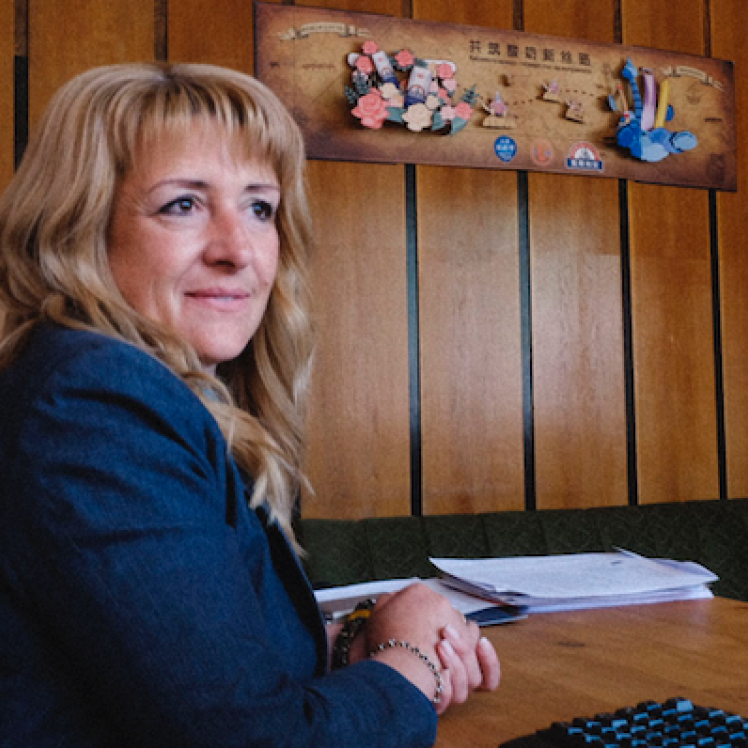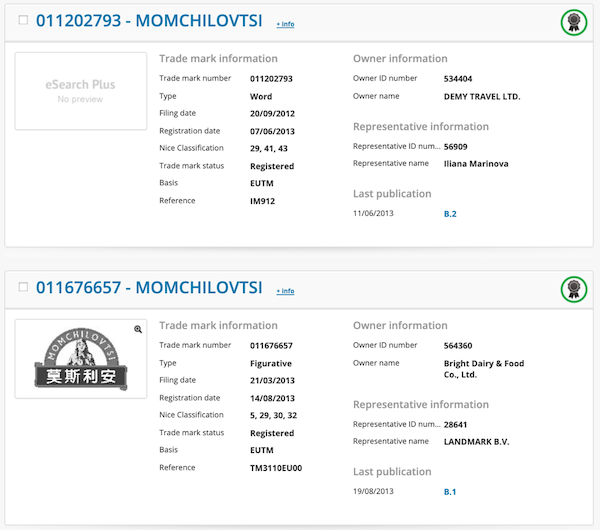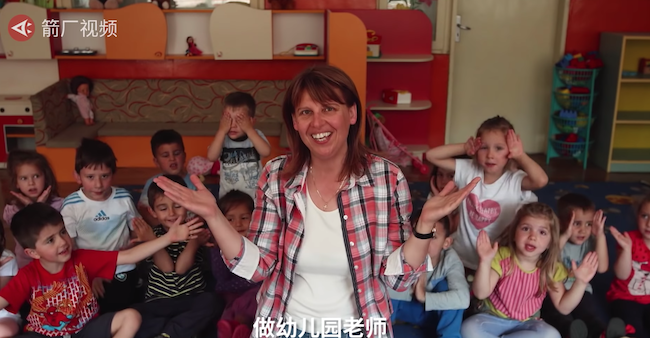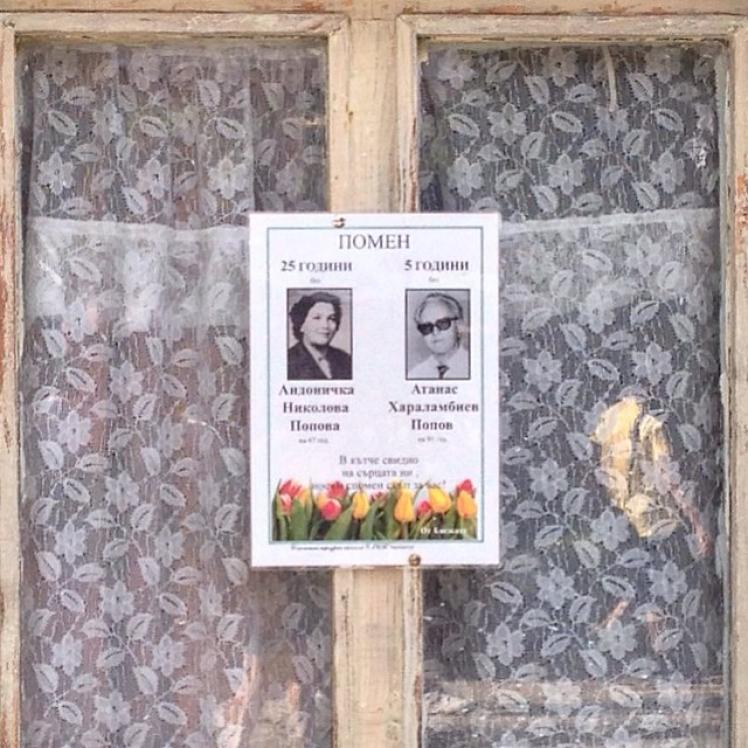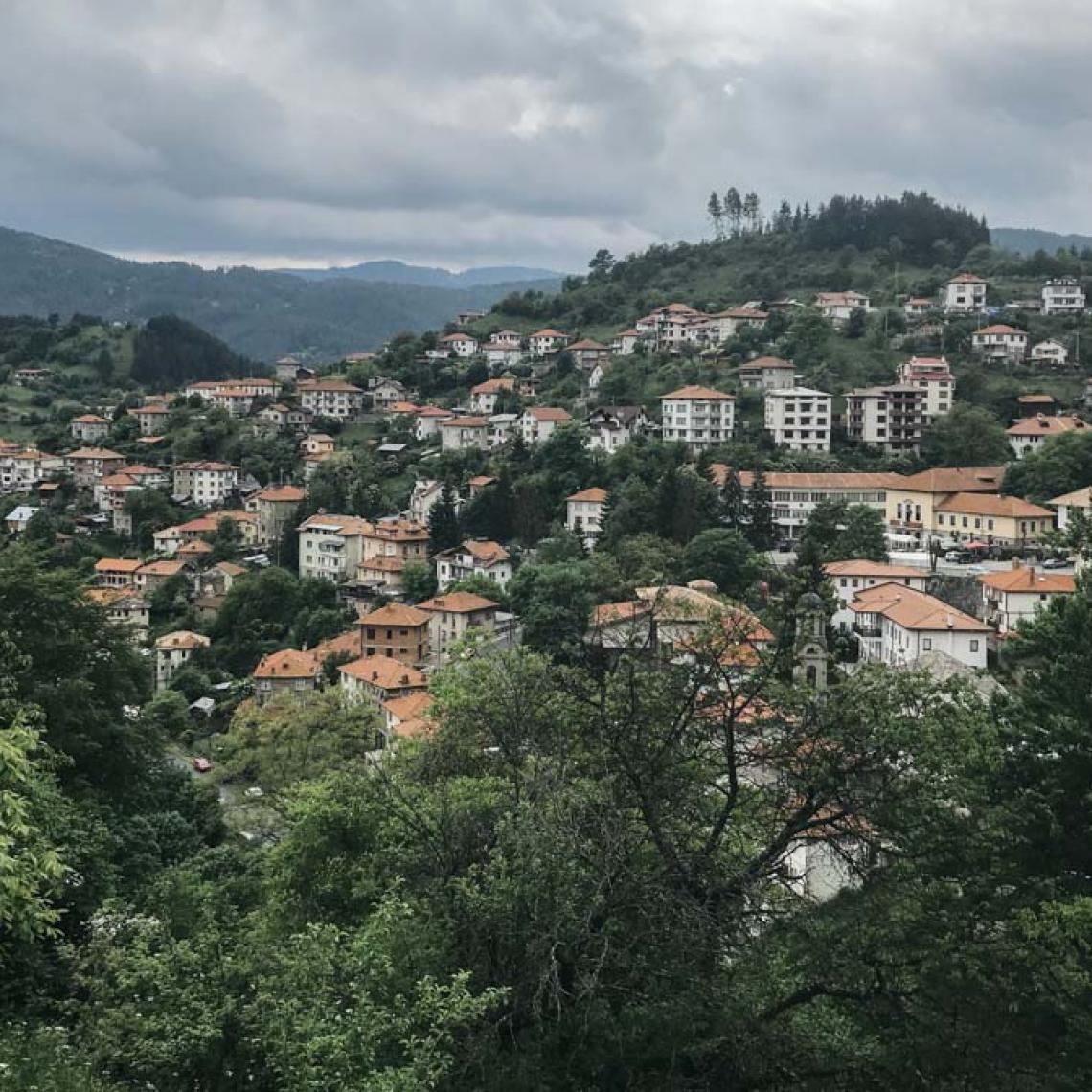
The peaceful village of Momchilovtsi, Bulgaria. Photo by Ning Hui / Initium.
The Secret of Longevity Village
Nestled deep in the mountains of southern Bulgaria is the most unlikely of connections, between a tiny village and a multinational food and beverage giant based in the Chinese metropolis of Shanghai.
On this unusual map of the world, Eastern Europe is represented at one end by two boxes of yogurt surrounded by the iconic pink roses of Bulgaria and bearing the brand name “Mosili’an.” Off to the East, at the opposite end, is an artist's rendering of the Chinese megacity of Shanghai, teeming with modern skyscrapers. A train of camels plods between the two points, and a slogan across the top reads, in both in Chinese and Bulgarian: “Jointly Building a Yogurt New Silk Road" (共筑酸奶新丝路). The map hangs in a small village called Momchilovtsi nestled deep in the mountains of southern Bulgaria, about 50 kilometers from the Greek border. Home to just 1,200 people, the village has become a household name in China, thanks to aggressive marketing by Bright Dairy, a listed subsidiary of Shanghai’s Bright Food Group.
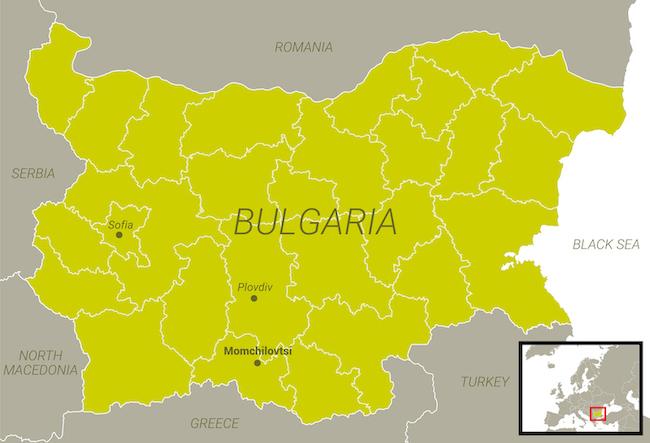
For Chinese, the village of Momchilovtsi (莫姆奇洛夫齐) is known by the shorter and more palatable “Mosili’an” (莫斯利安) – just four characters instead of six. No one is sure exactly how the variation came to be. But one guess is that Chinese marketers adopted the village’s opening “Mo” sound, and for the rest substituted an approximate rendering of “Smolyan,” the name of the province in which the village is located. Outside the Chinese language, the brand name remains "Momchilovtsi," the village's romanized name.
Lingering Doubts
Serious problems with China's domestic milk and formula supply first came to light in July 2008 as infants in Gansu province were diagnosed with kidney stones and medical professionals reported to health officials that all had been fed formula manufactured by Hebei's Sanlu Group. Although several major media outlets, including Guangzhou's Southern Weekly newspaper, had planned to publish in-depth reports in July, Chinese authorities kept the story under wraps to prevent embarrassment as Beijing hosted the Olympic Games. The scandal exploded only on September 11, with a report in Shanghai's Oriental Morning Post linking infant kidney stones to Sanlu formula. A product recall was finally announced, more than six weeks after local health officials first learned of the problems.
Though the Sanlu Group was singled out as the worst culprit, domestic milk and formula brands from 21 other companies, including Shanghai's Bright Dairy, were found to contain the chemical compound melamine, often used in plastic and fertilizer production. The milk scandal claimed the lives of at least six children, and an estimated 300,000 children suffered from kidney stones and other ailments in China in 2008 as a result of tainted milk and formula. More than a decade later, the 2008 milk scandal continues to shadow China's milk products industry.
For Bright Dairy, the result has been not just catchy but extremely lucrative. The company launched its Momchilovtsi yogurt brand in mainland China in 2009, its main selling point being that no refrigeration was necessary during the distribution and sales process. At the same time, this "room-temperature yoghurt” was marketed in China as a “healthy food product,” or jiankang shipin (健康食品).
This push for new branding came in the wake of the 2008 milk scandal in China, in which milk and infant formula from domestic manufacturers, including Bright Dairy, were found to contain melamine. The milk scandal encouraged widespread distrust of locally-produced milk products in China, and enhanced the appeal of foreign brands.
Employing its two-pronged marketing strategy centered on the supposed healthiness of an apparently foreign-sourced product that required no refrigeration, Momchilovtsi steadily grew in popularity after its launch, particularly in second and third-tier cities. Its sales were given a big boost in 2012 as distribution went fully nationwide. By 2014, annual sales had reached 6 billion yuan. Finally, in 2017, Momchilovtsi landed on the Hong Kong market.
Visitors in "Longevity Village"
With its now popular advertising slogan, "The Magical Secret of Longevity Village," Bright Dairy has profited immensely from the Momchilovtsi brand, encouraging Chinese consumers to imagine new horizons of youth and good health. That imagination begins with an image readily seen on all Momchilovtsi packaging – that of a young girl dressed in traditional Bulgarian garb and holding a milk jug. The image was not invented out of thin air, but in fact comes from the old village emblem of Momchilovtsi, which features a similar young woman holding instead a loaf of bread.
Momchilovtsi is a quiet place. Hundreds of small buildings, all with the same bright white walls and red-tile rooftops, cluster together along the contours of the mountains, which are covered with lush pine forests and verdant pastureland. The road up to the village road is quite steep, and a sign at the base of the road cautions visitors that there are bears lurking in the forest.
According to the village's own history, Momchilovtsi derives its name from Momchil Yunak, a Christian hero who resisted the Turkish invasion in the 14th century.
There is just one minibus per day connecting the village to Plovdiv, Bulgaria's second largest city. Similar villages are scattered among the Rhodope Mountains in southern Bulgaria. Most of these villages share a traditional craft – the making of yogurt.
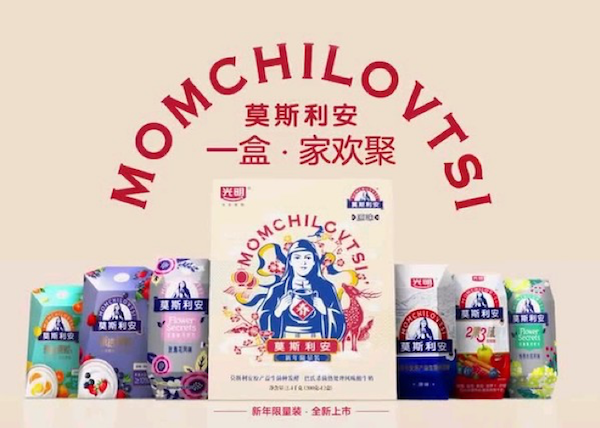
An advertisement for Momchilovtsi milk products in China.
In the summer of 2008, people from China’s Bright Dairy arrived in Momchilovtsi for the first time. Baba Dobi, an old woman who lives near the village gate, received the group and introduced them to the local practice of making yoghurt. The process is not complicated: filter and heat fresh milk to the proper temperature; mix it with a small spoonful of yoghurt containing a culture of lactobacillus for fermentation; finally, seal the mixture for several hours.
The 74-year-old Baba Dobi has a bit of difficulty walking now, but she is full of cheerful spirit. She very clearly recalls that there were five or six people from Bright Dairy. They left the village after spending less than two hours there. When they left, they took with them a jar of her homemade yogurt.
In 2012, four years after leaving Baba’s farm, representatives from Bright Dairy returned to the village of Momchilovtsi. By this time already, Momchilovtsi had been transformed in the minds of consumers in faraway China into the "longevity village" of "Mosili'an."
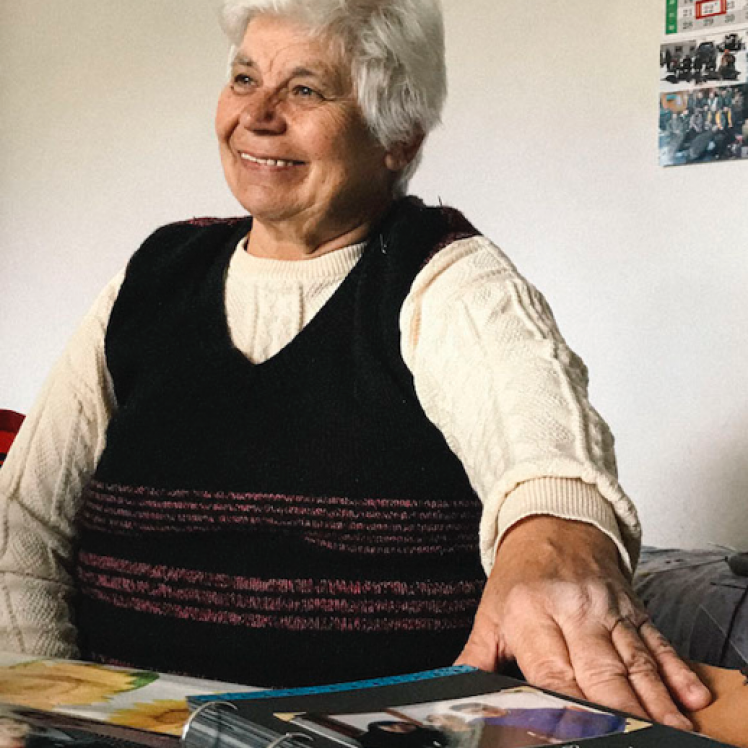
Baba Dobi was the first villager to receive guests from China's Bright Dairy in Momchilovtsi. Photo by Ning Hui / Initium.
Tall Tales About Longevity and Sour Milk
Bulgaria has long been known for the quality of its yogurt, and in the local culture yogurt has traditionally been associated with good health and long life. It is a source of pride for Bulgaria that the bacteria essential to yogurt culture – Lactobacillus bulgaricus – can be found naturally in the country, and that it was first identified in 1905 by a Bulgarian researcher named Stamen Grigoroff, and named after the country itself.
Bulgaria's close association with yogurt has drawn many dairy professionals to the country. In the 1970s, Japan's Meiji Holding's purchased from Bulgaria, which it called "the birthplace of yogurt," the naming rights to Meiji Bulgaria Yogurt. The yogurt's release in Japan and elsewhere in East Asia was a major success, and every year Meiji pays the state-owned LB Bulgaricum 5 million Euros for patent licensing of its lactobacillus LB81.
But fermenting the lactobacillus in milk, a key part of the process of yogurt production that Baba Dobi introduced to her Bright Dairy visitors more than a decade ago, was ultimately of no importance to the Chinese group. Momchilovtsi brand yogurt employs aseptic packaging technology that enables yogurt to be stored and then consumed at normal temperatures, without the need for refrigeration, and this means that the lactobacillus cultures in the milk, which many see as the source of its health benefits, must be destroyed in the process.
Bright Dairy’s liquid yogurt drink is worlds away from Bulgaria’s thick and rich traditional yogurt. The “secret recipe” Bright Dairy acquired when visiting Baba’s farm in 2008 has nothing whatsoever to do with the yogurt itself or with Baba's recipe. Nor does it have anything to do with the global image of Bulgarian yogurt per se. It has everything to do with Momchilovtsi itself, with an authentic Bulgarian village where the ancient traditions of yogurt making are maintained to this day.
The company's creative act was all about storytelling.
According to this story, the Russian-born biologist Élie Metchnikoff, a recipient of the Nobel Prize in physiology in 1908 who is credited today as one of the founders of the field of immunology, had conducted his own research on longevity in the village of Momchilovtsi. In an online version of the story pushed by Bright Dairy, an old black-and-white photograph of Metchnikoff is superimposed on an contemporary black-and-white image of the village, a bright gold Nobel medallion at the bottom left. The explanation reads:
Nobel Prize recipient Metchnikoff came to the mysterious Momchilovtsi village to carry out deep investigations and systematic research, and he discovered that the local villagers all had the custom of drinking yogurt, and that this was closely connected with the health and longevity of the local people. Later, people called the unique active probiotic strain in the local yogurt “the Momchilovtsi probiotic culture.”
There is no evidence, in fact, that Metchnikoff ever visited Momchilovtsi, or any other Bulgarian village. He did deliver a lecture in 1904, however, when he was head of research at the Pasteur Institute in Paris, in which he suggested that aging was precipitated by harmful bacteria in the intestines, and that one way to combat this was to encourage helpful bacteria in the body by eating yogurt or other sour milk products. For his knowledge of Bulgarian yogurt, Metchnikoff was very much in the debt of the young Bulgarian researcher Grigoroff, credited with discovering the Lactobacillus bulgaricus in the Geneva lab of Léon Massol.
Bright Dairy’s liquid yogurt drink is worlds away from Bulgaria’s thick and rich traditional yogurt . . . . The company's creative act was all about storytelling.
In his 1908 book The Prolongation of Life: Optimistic Studies, Metchnikoff notes (on page 175) the work of Grigoroff, who "has been surprised by the number centenarians to be found in Bulgaria, a region in which yahourth, a soured milk, is the stable food.”
Metchnikoff’s experiments purporting to link longevity among Bulgarian villagers with their habitual consumption of yogurt – relying largely on samples of yogurt brought to Paris by Grigoroff – are not regarded today as serious science. But his work, and his huge reputation at the time, not least as a Nobel Prize recipient, did result in a craze over yogurt in Paris and beyond, and the association between yogurt and health and longevity has been a boon for yogurt marketers ever since.
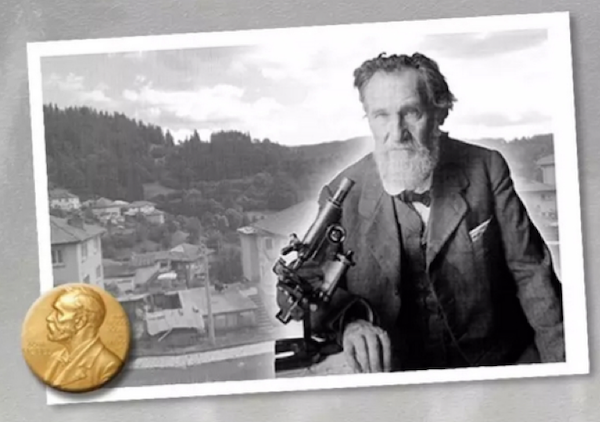
Russian-born biologist Ilya Ilyich Mechnikov, today considered a founder of immunology, is superimposed on a modern image of the village of Momchilovtsi in this this soft advertisement from Bright Dairy.

